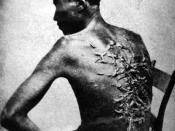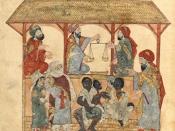"Sankofa"� which means "ÃÂone must return to the past to move to the future', is a powerful and very distinctive film depicting the harsh relations and conditions upheld on slave plantations. Of the many characters portrayed in this film, the females held a substantial role in slave society. In addition to being a field laborer, they were mothers to their children, wives to their husbands and servants to their master.
On many plantations, a female slave who was pregnant did not want their babies to be born is such societies as they were forced to live in. In the film, a character named Kuta was in such a predicament. In many cases, a female slave would try to run away to freedom and have their baby on free land as opposed to having the child grow up in bondage. If successful, they reached freedom but if not, they were captured and brought back, usually to a very harsh punishment.
There's also documented cases of mothers killing their own children, in fear of them growing up in such inhumane conditions and being used as pawns in power struggle relations between owners and slaves, as mentioned in Darlene Clark Hine's "Female Slave Resistance: The Economics of Sex."� These two and many more practices were acts of resistance toward the slavery system. Because these enslaved mothers wanted their children to grow up free of this type of lifestyle, they were willing to go to extreme measures to see it happen. Therefore, these acts of resistance were committed and served its purpose.
"Sankofa's"� main character, Shola, was a house slave who encountered many experiences on the plantation. Because she was a house slave and not a field laborer, she somewhat had a higher status than those out in the field.


